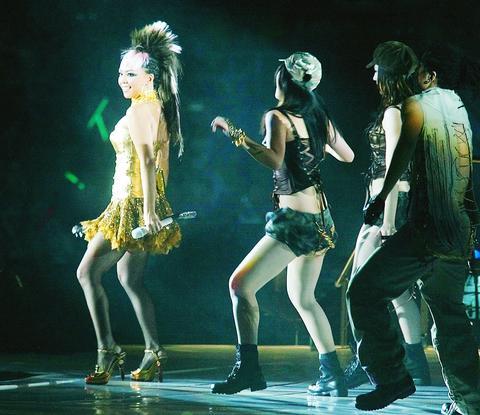Pop music diva Chang Hui-mei (張惠妹), also known as A-mei, returned home early yesterday after performing in a controversial concert in Beijing on Saturday night. The singer was following through on her earlier vow to hold the Beijing concert despite threats of disruption by Chinese ultra-nationalists.
Throngs of protesters heckled the Puyuma Aboriginal singer, holding red banners protesting "pro-independence Taiwanese businesspeople." Her Chinese fans rushed to her defense, however, leading to scuffles between the two groups, which were quickly broken up by Chinese police.

PHOTO: AP
According to media reports, A-mei's fans begged her not to be disturbed by the raucous protesters, who were also demanding that A-mei sing March of the Volunteers, the Chinese national anthem.
The singer reportedly broke down and wept onstage, even as her Chinese supporters cheered her on and called out to her not to cry. A-mei told the estimated 10,000-strong audience that she had never felt such great pressure at a concert before.
Still, the 31-year-old singer from Taitung County carried on and finished her set.
A-mei became the focus of international controversy on June 12 when she was forced to cancel a concert in Hangzhou after students from Zhejiang University branded her a "supporter of Taiwanese independence." Several hundred students invaded a press conference at which the pop star had been scheduled to appear, chanting slogans and holding banners decrying the "green performer." Fearing for A-mei's safety, the organizers canceled her appearance.
However, the Mainland Affairs Council later described the students as "Beijing's dupes," who were probably acting with official encouragement.
The lambasting of Taiwanese performers for their supposed political preferences is a common occurrence in China. Internet discussion boards and forums often carry virulently aggressive messages attacking Taiwanese "splittists," China's propaganda term of choice for pro-independence or anti-unification figures.
After the re-election of President Chen Shui-bian (
A-mei initially gained the attention of Chinese authorities after singing the national anthem at Chen's inauguration in 2000.
At that time, the singer was blacklisted, lost a sponsorship deal with the Coca-Cola company and was subjected to a media blackout in China.
Yesterday, in a bizarre turn of events, some pro-independence groups called for a boycott of A-mei in response to comments she made upon her return, which were apparently meant to mollify her Chinese critics.
"I'm a Chinese person, and I sing Chinese people's songs," the singer told reporters at CKS International Airport.
"Shame on you A-mei. You are an embarassment to Aborigines and all Taiwanese people," one contributor wrote on a forum discussing A-mei at www.southnews.com.tw.

The first two F-16V Bock 70 jets purchased from the US are expected to arrive in Taiwan around Double Ten National Day, which is on Oct. 10, a military source said yesterday. Of the 66 F-16V Block 70 jets purchased from the US, the first completed production in March, the source said, adding that since then three jets have been produced per month. Although there were reports of engine defects, the issue has been resolved, they said. After the jets arrive in Taiwan, they must first pass testing by the air force before they would officially become Taiwan’s property, they said. The air force

GLOBAL: Although Matsu has limited capacity for large numbers of domestic tourists, it would be a great high-end destination for international travelers, an official said Lienchiang County’s (Matsu) unique landscape and Cold War history give it great potential to be marketed as a destination for international travelers, Tourism Administration Director General Chen Yu-hsiu (陳玉秀) said at the weekend. Tourism officials traveled to the outlying island for the Matsu Biennial, an art festival that started on Friday to celebrate Matsu’s culture, history and landscape. Travelers to Matsu, which lies about 190km northwest of Taipei, must fly or take the state-run New Taima passenger ship. However, flights are often canceled during fog season from April to June. Chen spoke about her vision to promote Matsu as a tourist attraction in

PAWSITIVE IMPACT: A shop owner said that while he adopted cats to take care of rodents, they have also attracted younger visitors who also buy his dried goods In Taipei’s Dadaocheng (大稻埕), cats lounging in shops along Dihua Street do more than nap amid the scent of dried seafood. Many have become beloved fixtures who double as photography models, attracting visitors and helping boost sales in one of the capital’s most historic quarters. A recent photo contest featuring more than a dozen shop cats drew more than 2,200 submissions, turning everyday cat-spotting into a friendly competition that attracted amateur and professional photographers. “It’s rare to see cats standing, so when it suddenly did, it felt like a lucky cat,” said Sabrina Hsu (徐淳蔚), who won the NT$10,000 top prize in

STRIKE: Some travel agencies in Taiwan said that they were aware of the situation in South Korea, and that group tours to the country were proceeding as planned A planned strike by airport personnel in South Korea has not affected group tours to the country from Taiwan, travel agencies said yesterday. They added that they were closely monitoring the situation. Personnel at 15 airports, including Seoul’s Incheon and Gimpo airports, are to go on strike. They announced at a news conference on Tuesday that the strike would begin on Friday next week and continue until the Mid-Autumn Festival next month. Some travel agencies in Taiwan, including Cola Tour, Lion Travel, SET Tour and ezTravel, said that they were aware of the situation in South Korea, and that group